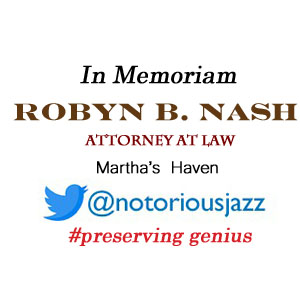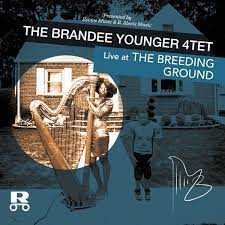
Daily Dose Of Jazz…
Brandee Younger was born on July 1, 1983 in Hempstead, New York and grew up between her birth city and Uniondale, New York. She began her harp studies as a teen under the tutelage of Karen Strauss and continued with several harpists and bassist Nat Reeves. On to undergrad she earned degrees in Harp Performance and Music Business from The Hartt School of the University of Hartford. While at the latter she was mentored by Jackie McLean and the faculty of the Jackie McLean Institute of Jazz and African American Studies.
Off to New York University for grad school six months later with an impressive résumé, she opened for Slide Hampton as a member of Hartford-based collective The New Jazz Workshop. Younger then developed a working relationship with Grammy-nominated producer and artist Ryan Leslie and Grammy Award-winning producer Omen. Building upon that foundation, Younger began working with saxophonist Ravi Coltrane on a series of concerts honoring the music of his late mother, harpist Alice Coltrane.
Over time, Younger has built her career as an educator, concert curator, performer, and bandleader of the Brandee Younger Quartet. Her debut recording as a leader came with Prelude, released in 2011 with Dezron Douglas, E.J. Strickland and vocalist Niia. Since that auspicious moment she has performed with The Harlem Chamber Players, the Hartford Symphony Orchestra, Waterbury Symphony, Soulful Symphony, Ensemble Du Monde, Camerata New York and the Red Bull Artsehcro.
Younger is on the teaching artist faculty (harp) at New York University and The New School College of Performing Arts. She has taught at Adelphi University, Nassau Community College, The Hartt School Community Division at the University of Hartford and has lectured on both sides of the pond. As a leader she has released 6 albums and two compilations since her debut album Prelude in 2011. As a sidewoman/contributor since 2006 she has 38 albums to her credit with folks like E. J. Strickland, Ravi Coltrane, Jeremy Pelt, Common, Robert Glasper, Jane Monheit, Christian McBroide, Lauryn Hill, Drake, and more.
Harpist Brandee Younger infuses classical, jazz, soul, and funk influences to the harp tradition pioneered by her predecessors and idols Dorothy Ashby and Alice Coltrane. She continues to explore and expand her musical vocabulary.
More Posts: bandleader,educator,harp,history,instrumental,jazz,music
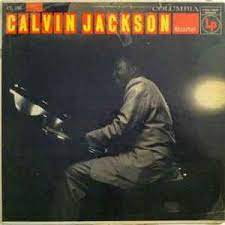
Daily Dose Of Jazz…
John Calvin Jackson was born May 26, 1919 in Philadelphia, Pennsylvania to a concert singer mother. He played piano from childhood, taking lessons with a private teacher. He went on to study at Juilliard and New York University.
At the beginning of his career Jackson worked with Frankie Fairfax. Moving to Los Angeles, California from 1943–47 he worked in Hollywood as an assistant director of music for MGM on productions including Meet Me in St. Louis and Anchors Aweigh.
1947 saw Calvin recording with Phil Moore and also as a solo pianist for Discovery Records. The following summer he played with singer Mildred Bailey and dancer Avon Long at Café Society in New York City. In 1950, he moved to Toronto, Canada where he often played on television and radio. Throughout the 1950s and early 1960s he released several LPs for labels such as Columbia Records.
Returning to Los Angeles in 1957 he resumed work as a composer and orchestrator for television and hit musicals like Where The Boys Are and The Unsinkable Molly Brown, which was Oscar-nominated for best adapted score. Occasionally he could be seen on screen as a piano-playing character.
Jackson arranged for Ray Charles at one point, receiving an arrangement and co-producer credit for Charles’ 1964 release Sweet & Sour Tears . By the early 1980s, he moved to San Diego County, where he lived in semi-retirement where he gave music lessons on a piano in his apartment. In 1984 he sat in as a guest at the Sunday night jam sessions Jeannie and Jimmy Cheatham hosted at the Bahia resort on Mission Bay, playing piano and harmonica between sets and occasionally with the band.
He was working on arrangements for a 31-piece concert jazz orchestra in Point Loma when he developed a heart ailment and was taken to the hospital. Pianist, composer, and bandleader Calvin Jackson transitioned on December 9, 1985 at age 66.
More Posts: history,instrumental,jazz,music,piano
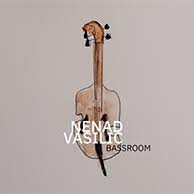
Daily Dose Of Jazz…
Nenad Vasilic was born on May 8, 1975 in Niš, Serbia and started playing piano at the age of 5. By twelve he received his first bass guitar and at the age of 15 he enrolled in the Secondary Music School in Niš. When he was 19 he studied contrabass and bass guitar at the Jazz Academy in Graz, Austria.
In 1998 he formed his own band Vasilić Nenad Balkan Band and 1999 saw him in Austria recording his debut album as a leader titled Jugobasija. Since that first outing he has produced albums as a band leader, double bass player and composer, collaborating with jazz singers Mark Murphy and Sheila Jordan, as well as Ritchie Beirah, Peter Ralchev, Vlatko Stefanovski, Wolfgang Puschnig, Bojan Zulfikarpasic, John Hollenbeck, Martin Lubenov, Stjepko Gut, Bilja Krstić, Tamara Obrovac, Lori Antonioli, Amira Medunjanin and others.
Bassist, composer and bandleader Nenad Vasilic continues to explore the possibilities of his music creativity.
More Posts: bandleader,bass,history,instrumental,jazz,music
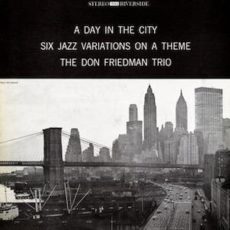
Daily Dose Of Jazz…
Donald Ernest Friedman was born in San Francisco, California on May 4, 1935 and began playing the piano at the age of four, switching from classical music to jazz after his family moved to Los Angeles, California when he was fifteen. His early jazz piano influence was Bud Powell and he briefly studied composition at Los Angeles City College.
He began playing in Los Angeles and moved to New York City in 1958. During the 1960s, he played with both modern stylists and more traditional musicians. The former included Coleman, Eric Dolphy, Jimmy Giuffre, Booker Little, and Attila Zoller; the latter, Bobby Hackett and Herbie Mann.
His debut album as a leader was A Day in the City, recorded in 1961. A few of his early albums received top ratings from DownBeat, which also gave him its critics’ poll New Star award. On the West Coast, Friedman performed with Dexter Gordon, Chet Baker, Buddy DeFranco, and Ornette Coleman. He was also a member of Clark Terry’s big band.
Pianist Don Friedman, who was also an educator in New York and had many fans in Japan, transitioned from pancreatic cancer on June 30, 2016 at his Bronx home.

More Posts: bandleader,history,instrumental,jazz,music,piano
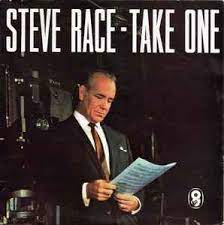
Daily Dose Of Jazz…
Stephen Russell Race was born April 1, 1921 in Lincoln, England and learned the piano from the age of five. His education from 1932 to 1937 was at Lincoln School, where he formed his first jazz group. At sixteen, he attended the Royal Academy of Music, studying composition under Harry Farjeon and William Alwyn. After leaving the academy, he wrote occasional dance band reviews for Melody Maker and, in 1939, joined the Harry Leader dance band as pianist, succeeding Norrie Paramor.
Race joined the Royal Air Force in 1941, and formed a jazz/dance quintet. After World War II, he began a long and productive career with the BBC, where his ready wit, musicianship and broad musical knowledge made him a much sought after musical accompanist for panel games and magazine shows, such as Whirligig and Many a Slip.
Simultaneously he played in the Lew Stone and Cyril Stapleton bands, and arranged material for Ted Heath. By 1949 The Steve Race Bop Group recorded some of the first British bebop records for the Paxton label. These included four sides with Leon Calvert, Johnny Dankworth, Peter Chilver, Norman Burns, Jack Fulton. He also developed a sideline arranging player piano rolls for the Artona company.
the 1950s to the 1980s, he presented numerous music programs on radio and television. Steve was the chairman of the long-running light-hearted radio and TV panel game My Music which ran for 520 episodes from 1967 to 1994. He also presented Jazz For Moderns and Jazz 625 for the BBC in the 1960s.
As a composer, he produced a number of pieces in the jazz, classical and popular idioms. Blue Acara, Esteban Cera, Faraway Music, Nicola, Ring Ding and Pied Piper aer just a few of his well known compositions. He appeared as pianist/bandleader in the 1948 film Calling Paul Temple and with Sid Colin wrote two of the songs performed by Celia Lipton. He also wrote other scores for films. His autobiography, Musician at Large, was published in 1979, and was inducted into the Order of the British Empire (OBE). Pianist, composer, radio and television presenter Steve Race had his first heart attack in 1965 and transitioned from a second attack at his home in Great Missenden, Buckinghamshire, on June 22, 2009.
More Posts: bandleader,composer,history,instrumental,jazz,music,piano



